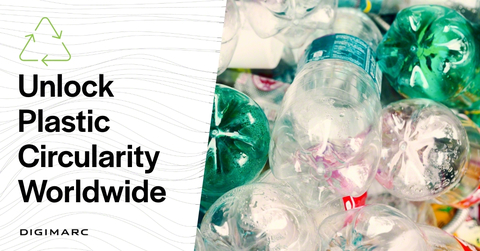Digimarc Recycle is Now Widely Available and Easily Accessible to Unlock Plastic Circularity Worldwide
Digimarc Corporation (NASDAQ: DMRC), the pioneer and global leader in digital watermarking technologies, today announced the wide availability and easy accessibility of Digimarc Recycle following successful pilots and testing in multiple countries worldwide. Digimarc Recycle represents a revolution in the sortation and recycling of plastic waste with the power to measurably advance the fight against plastic pollution, and this proven technology is now available for license by qualified partners for less than $1 per capita per year.
This press release features multimedia. View the full release here: https://www.businesswire.com/news/home/20240222238789/en/

Digimarc accelerates the global fight against plastic pollution. Digimarc Recycle is now widely available and easily accessible to unlock plastic circularity worldwide -- available for license by qualified partners for less than $1 per capita per year. (Graphic: Business Wire)
“After another year plagued with a lot of talk but little action in the fight to end plastic pollution, we are expanding our reach across stakeholders and geographies to encourage partners in the United States and around the world to join us on our mission to protect the planet,” said Digimarc President and CEO, Riley McCormack. “With today’s announcement, the technology proven to effect change is both accessible and affordable to a wide variety of partners across the recycling ecosystem without further delay.”
The Plastic Recycling Outlook
In the United States, the current ecosystem of plastics recycling does not work, as only 5-9% of plastics are fully recycled in the U.S. annually,1 which means that almost all plastics in the U.S. are discarded as waste.2 In 2021 alone, 51 million tons of plastic waste were generated in the U.S.3
One of the main reasons the world struggles to recycle plastic is due to the number of plastic variants that are created by industry and the limits of the optical sorting technology that exists at recycling facilities. Plastic packaging spans a huge range of types – from food- or skin-contact-grade to industrial-use plastics – and often contains multiple materials and layers, further compounding the challenges of sorting today. Current sorting technology can only identify, at a high level, some of the materials in each item, but it cannot identify the grade or complex composition of much of the material it works to sort. This means that it cannot sort based on specifications that would allow plastics to retain the value required to become truly circular – for example, determining if a plastic is food-grade. This disincentivizes producers to purchase and use recycled plastic as they are unable to acquire the plastic varieties and specifications they need.
Digimarc Recycle changes this dynamic by linking covert digital watermarks applied to plastic packaging to product information, including packaging composition, food or non-food grade plastic, product variant, brand, SKU, and more. Deploying digital watermarking, instead of solely relying on optical sortation, helps to create the variety, volume, and quality of recycled plastics needed for a viable circular economy to flourish. Roland Berger highlights Digimarc’s technology, digital watermarks, as a sorting technology that can “substantially improve the yield and quality of recyclates” – calling recyclates the “new gold.”4
Digimarc Recycle powers precise granular sortation of plastics, thereby increasing the opportunity for producers to purchase and repurpose higher quality recycled plastic that can compete on a level playing field with virgin materials. Digimarc’s digital watermarking technology makes this possible by identifying plastic packaging deterministically to any desired level of granularity including brand, SKU, SKU-variant, batch/lot, or even serialized item, none of which can be accomplished with current optical sorting technology or other proposed next-generation technologies. The application of Digimarc Recycle helps disincentivize the continued use of virgin plastics by producers and makes extended producer responsibility (EPR) schemes a more viable option to tackle the growing problem of plastic pollution.
“If we want producers to buy recyclate instead of continuing to use virgin plastic, we must improve the quality of plastic output at today’s recycling facilities and offer a real opportunity for closed-loop recycling. This is where Digimarc can help,” said McCormack. “Digital watermarking is a powerful, proven, and incredibly affordable solution to the plastic pollution crisis, and it is available today. We can talk about potential solutions, or we can commit to action. Our offer to license our groundbreaking technology to partners around the world underscores our belief that the time to act is now.”
Learn more about Digimarc Recycle at Digimarc.com or contact us at product@digimarc.com.
About Digimarc
Digimarc Corporation (NASDAQ: DMRC) is the pioneer and global leader in digital watermarking technologies. For nearly 30 years, Digimarc innovations and intellectual property in digital watermarking have been deployed at massive scale for the identification and the authentication of physical and digital items. A notable example of this is our partnership with a consortium of the world’s central banks to deter counterfeiting of global currency. Digimarc is also instrumental in supporting global industry standards efforts spanning both the physical and digital worlds. In 2023, Digimarc was named to the Fortune 2023 Change the World list and honored as a 2023 Fast Company World Changing Ideas finalist. Learn more at Digimarc.com.
| ____________________ | ||
1 |
Plastics: Material-specific data | US EPA. (n.d.). |
|
2 |
Sullivan, L. (2022, October 24). Recycling plastic is practically impossible - and the problem is getting worse. NPR |
|
3 |
Budryk, Z. (2022) US only recycled 5 percent of plastic waste in 2021: Greenpeace report, The Hill. |
|
4 |
Herweg, 0., Popa, D. (2023, March 15). Plastic Recyclates create new business opportunities for sector. Roland Berger |
|
View source version on businesswire.com: https://www.businesswire.com/news/home/20240222238789/en/
Contacts
Media Contacts:
Susan Baldwin
Digimarc Corporation
509-939-1137
PR@digimarc.com
Anneka Kumli
Grove Partners
720-422-5258
anneka@thegrovepartners.com





